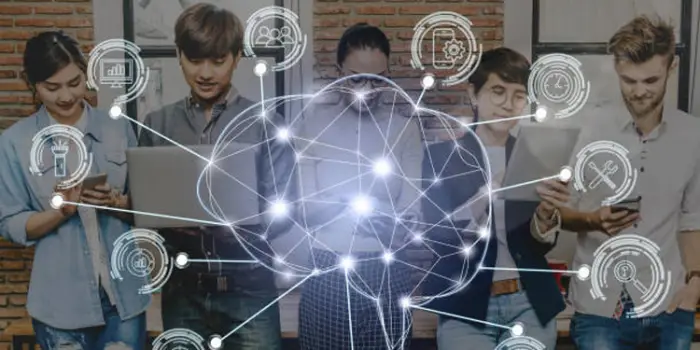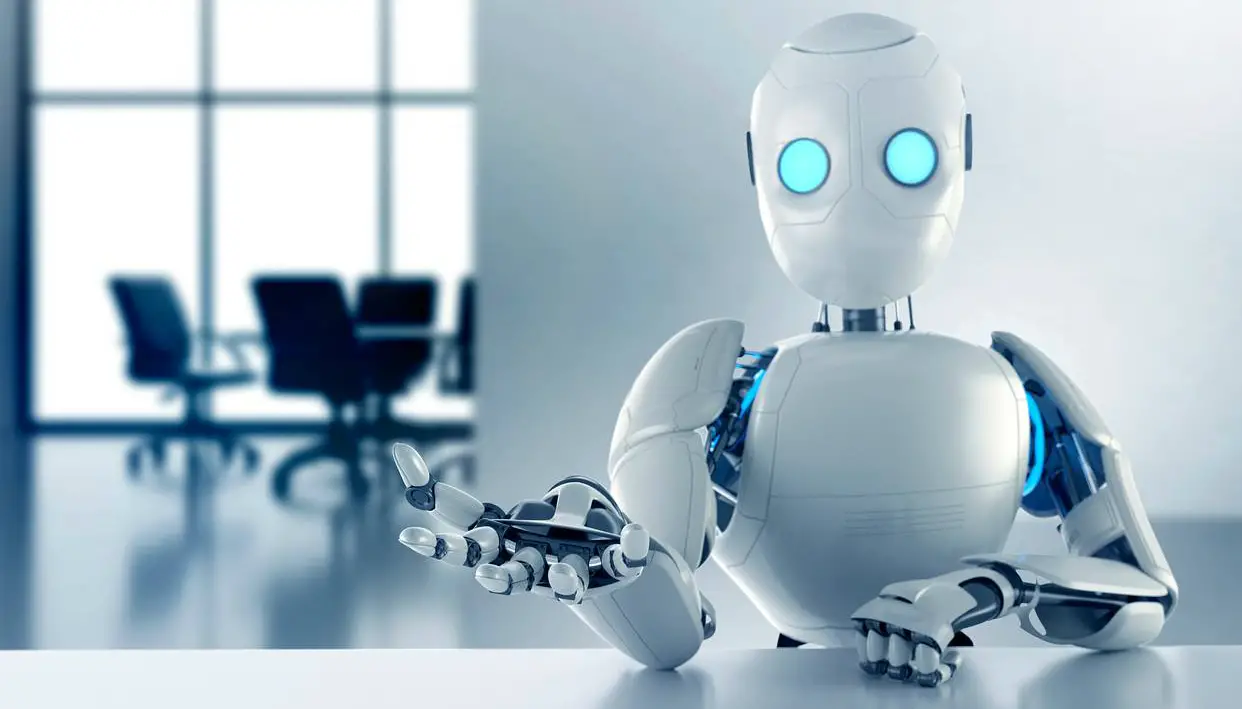The Impact of AI on Workplace Collaboration:

AI-Powered Collaboration Tools:

AI-driven tools such as virtual assistants, natural language processing (NLP), and machine learning (ML) algorithms are transforming the way teams collaborate. These tools automate mundane tasks, offer real-time translation, and provide contextually relevant information, facilitating effective communication and streamlining workflows.

Enhanced Communication and Understanding:
AI helps bridge language barriers through real-time translation, improving communication and collaboration among global teams. NLP-powered virtual assistants analyze conversations, extract key points, and generate summaries, enabling easy access to key information.
Personalized Collaboration Experience:
AI algorithms gather and analyze data from various sources, including employee feedback, communication patterns, and task preferences. This data is used to create personalized collaboration recommendations, such as suggested team members for specific projects or preferred communication channels for different individuals.
Automate Repetitive Tasks:
AI-powered automation handles routine tasks such as scheduling, data entry, and report generation, freeing up employees’ time for more creative and strategic work. Automated workflows improve efficiency, accuracy, and compliance, fostering a collaborative environment where employees can focus on high-value tasks.
Improved Decision-Making:
AI-driven collaboration tools analyze vast amounts of data and provide actionable insights, supporting evidence-based decision-making. These tools identify trends, patterns, and potential risks, enabling teams to make informed choices and adjust strategies accordingly.
Challenges and Considerations:
Data Privacy and Security:
Adopting AI in the workplace requires careful attention to data privacy and security. Organizations must implement robust measures to protect sensitive information and ensure compliance with regulations.
Integrating AI with Existing Systems:
For AI to effectively enhance collaboration, it must seamlessly integrate with existing business software and tools. Organizations need to assess compatibility, data transfer protocols, and user training requirements to ensure a smooth integration.
Bias Mitigation:
AI systems can perpetuate biases if not thoughtfully designed and implemented. Organizations should actively work to mitigate bias by conducting regular audits, encouraging diverse perspectives in AI development, and promoting inclusive practices in AI-driven collaboration.
Conclusion:
The impact of AI on workplace collaboration is multifaceted, promising improved communication, enhanced understanding, personalized collaboration experiences, automated tasks, and data-driven decision-making. To harness the full potential of AI, organizations must address data privacy concerns, ensure seamless integration with existing systems, and proactively mitigate potential biases. By leveraging AI responsibly and inclusively, organizations can foster a collaborative workplace that empowers teams to achieve greater productivity, innovation, and strategic alignment.Title: The Impact of AI on Workplace Collaboration
Executive Summary:
Artificial Intelligence (AI) is rapidly transforming the landscape of workplace collaboration, impacting communication, teamwork, and overall productivity. This comprehensive article delves into the profound influence of AI on collaboration in the workplace, exploring key subtopics such as AI-powered communication tools, virtual teams, automation, data analytics, and security considerations. With insightful analysis and practical examples, this article highlights the transformative potential of AI in fostering seamless collaboration and driving organizational success.
Introduction:
In today’s dynamic business environment, effective collaboration is crucial for driving innovation and achieving organizational goals. As technology continues to advance, AI is emerging as a powerful force that is redefining how teams connect, communicate, and work together. This article provides a comprehensive overview of the impact of AI on workplace collaboration, exploring specific subtopics and their implications for businesses and professionals alike.
AI-Powered Communication Tools:
AI is revolutionizing the way we communicate in the workplace. From intelligent chatbots to natural language processing-based virtual assistants, AI-driven tools are enhancing communication efficiency and accuracy.
-
Intelligent Chatbots: These AI-powered chatbots provide real-time assistance to employees, offering instant responses to queries, resolving common issues, and scheduling appointments.
-
Natural Language Processing (NLP): NLP-based virtual assistants understand human language, enabling seamless communication between employees and AI systems.
-
Machine Translation: AI algorithms facilitate real-time translation of messages and documents, breaking down language barriers and enabling global collaboration.
-
Sentiment Analysis: AI can analyze written or spoken communication, detecting sentiment and identifying potential issues or opportunities for improvement.
-
Personalized Recommendations: AI algorithms analyze user data to provide personalized recommendations, including relevant contacts, documents, and resources, enhancing collaboration efficiency.
Virtual Teams:
AI is facilitating the formation and success of virtual teams, bridging geographical and cultural boundaries.
-
Improved Team Coordination: AI-powered tools streamline task management and resource allocation, enabling seamless coordination among team members across different locations.
-
Virtual Collaboration Platforms: These platforms offer a centralized space for virtual teams to communicate, share files, and collaborate on projects, fostering a sense of unity and purpose.
-
AI-Enabled Brainstorming: AI algorithms generate creative ideas and solutions by analyzing large datasets and identifying patterns that humans might miss.
-
Virtual Team Building: AI can facilitate team-building activities and social interactions, strengthening bonds among virtual team members and fostering a collaborative culture.
-
Remote Training and Development: AI-driven platforms provide personalized training and development opportunities, catering to the specific needs of individual team members, regardless of their location.
Automation of Repetitive Tasks:
AI is automating routine and repetitive tasks, allowing employees to focus on higher-value, strategic activities.
-
Intelligent Process Automation (IPA): IPA bots automate repetitive, rule-based tasks, such as data entry, scheduling, and report generation, increasing efficiency and reducing errors.
-
Robotic Process Automation (RPA): RPA software robots perform manual, repetitive tasks, such as data extraction, form filling, and system integration, freeing up human workers for more creative and fulfilling roles.
-
Cognitive Automation: This advanced form of automation involves AI algorithms that can learn, adapt, and make decisions, enabling automation of complex tasks.
-
Improved Data Quality: AI algorithms can detect and correct errors in data, ensuring data integrity and accuracy, which is vital for effective collaboration.
-
Enhanced Productivity: By automating repetitive tasks, AI frees up valuable time for employees to focus on strategic initiatives, innovation, and customer-centric activities.
Data Analytics for Collaboration:
AI is transforming how businesses collect, analyze, and leverage data to drive effective collaboration.
-
Real-Time Data Analytics: AI algorithms analyze data in real time, providing actionable insights that enable teams to make informed decisions quickly and effectively.
-
Predictive Analytics: AI algorithms can predict future trends and outcomes, allowing teams to anticipate challenges and opportunities and adapt their strategies accordingly.
-
Collaboration Analytics: AI-powered tools analyze collaboration patterns, identifying areas for improvement and opportunities to enhance team dynamics.
-
Personalized Collaboration Recommendations: AI can generate personalized recommendations for team members, such as potential collaborators, relevant resources, and effective communication channels.
-
Data-Driven Decision-Making: By providing real-time insights and predictive analytics, AI empowers teams to make data-driven decisions, leading to improved outcomes and overall collaboration effectiveness.
Security Considerations in AI-Enabled Collaboration:
While AI offers significant benefits, it also raises security considerations that need to be addressed.
-
Data Privacy and Security: AI systems process vast amounts of sensitive data, making data privacy and security paramount. Robust measures must be in place to protect data from unauthorized access, breaches, and misuse.
-
AI Bias and Fairness: AI algorithms can exhibit bias, leading to unfair or discriminatory outcomes. It is essential to address AI bias and ensure algorithms are fair and unbiased, fostering inclusive and productive collaboration.
-
Accountability and Transparency: As AI systems become more autonomous, accountability and transparency become key concerns. Clear guidelines and regulations are needed to ensure AI systems are responsible, transparent, and auditable.
-
Ethical Considerations: AI raises ethical considerations related to job displacement, privacy, and algorithmic decision-making. Organizations must address these ethical implications and develop responsible AI practices that align with organizational values and societal norms.
-
Cybersecurity and AI: AI can be used to enhance cybersecurity, but it also presents new attack surfaces. Organizations must implement robust cybersecurity measures to protect against AI-enabled cyberattacks.
Conclusion:
AI is having a transformative impact on workplace collaboration, revolutionizing the way teams communicate, work together, and achieve organizational goals. From AI-powered communication tools to virtual teams, automation of repetitive tasks, data analytics for collaboration, and security considerations, AI is redefining the landscape of workplace collaboration. By embracing AI and implementing it strategically, businesses can unlock the full potential of collaboration, driving innovation, productivity, and overall organizational success.
Keyword Phrase Tags:
- AI-Powered Collaboration
- Virtual Teams and AI
- Automation in Collaborative Work
- AI-Driven Data Analytics for Collaboration
- AI and Collaboration Security


Soooo amazing article!!1! This is the best article I have ever read about the impact of AI on workplace collaboration. This is absolutely amazing! Thank you for sharing this wonderful article.
Well, I have to say that this article has some good points, ‘m not sure if everything it says is true though. I think AI is still a long way off from having a major impact on the workplace.
This article provides a good overview of the potential impact of AI on workplace collaboration. However, the author doesn’t go into enough detail about the specific ways in which AI can be used for collaborative purposes. I think it would have been helpful to include more examples of specific case studies where AI has been successfully used to improve collaboration.
I think the author is too optimistic about the impact of AI on workplace collaboration. AI is still a very new technology is still a long way from being able to fully replace human collaboration. I believe that AI will have a limited impact on workplace collaboration, and that it will only be used for tasks that are repetitive or that require a lot of data analysis.
Oh, AI is going to revolutionize workplace collaboration? That’s hilarious! AI is nothing more than a buzzword that’s being used to sell us new software. I don’t think AI is going to have any impact on workplace collaboration whatsoever.
I’m sure this article is very well-written and informative, but I’m just not interested in reading about the impact of AI on workplace collaboration. I think AI is a waste of time, and I don’t think it’s going to have any real impact on the workplace. I’d rather read about something more interesting, like the history of the rubber ducky.
I’m not sure what I’m supposed to say about this article. I mean, it’s about AI and workplace collaboration. That’s like, super boring! I’d rather talk about something more interesting, like the time I accidentally set my hair on fire while trying to curl it.